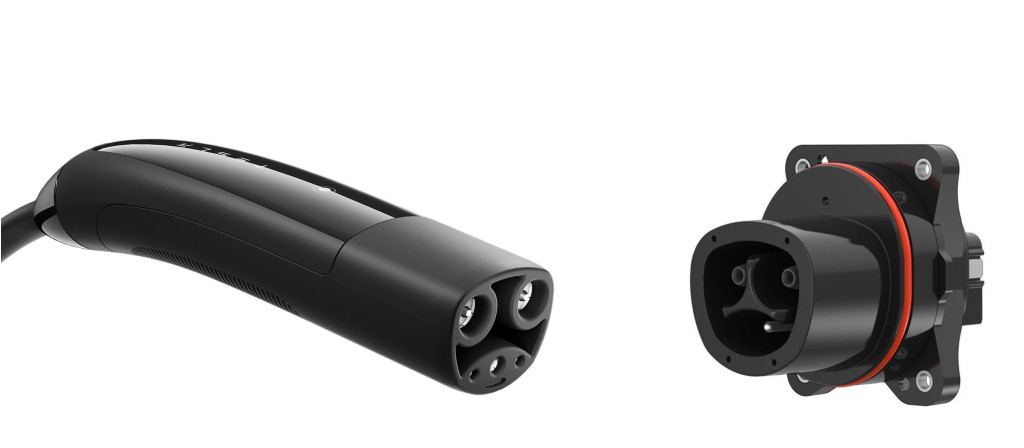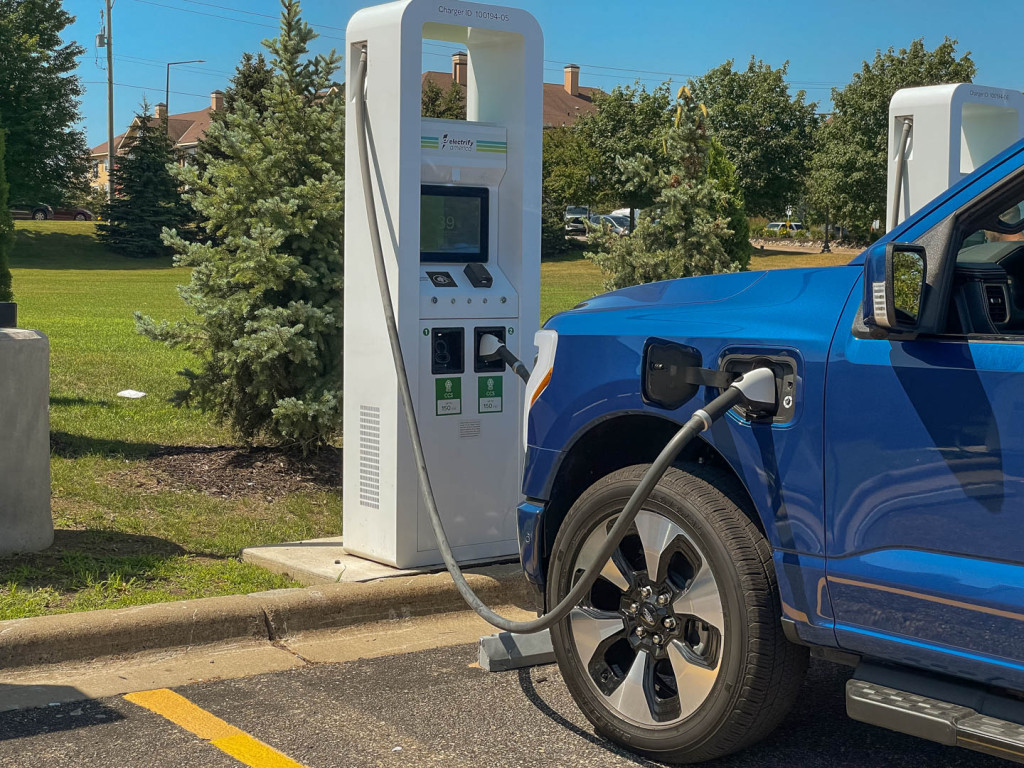Ford CEO Jim Farley and Tesla CEO Elon Musk together on Thursday, in a Twitter Spaces reveal, announced that Ford is planning to shift to Tesla’s charging interface—and the superior fast-charging experience of Tesla Superchargers—starting with its next-generation EVs in 2025.
Those next-generation models will have the familiar Tesla port, called North American Charging Standard (NACS), built in, with charging at Tesla Supercharger stations requiring no adapter.
As new Ford EVs are introduced, it will be abandoning the CCS standard in the U.S. completely. When asked whether next-generation Ford EVs will have the CCS port, Ford replied to Green Car Reports: “Gen 2 EVs with the NACS port will have the option of charging at CCS chargers via an adapter.“
2022 Ford F-150 Lightning
In the meantime, Ford F-150 Lightning, Mustang Mach-E, and E-Transit vehicles that have the Combined Charging System (CCS) port will be able to charge at 12,000 Tesla Superchargers across the U.S., with a Tesla-developed adapter that will be in production early next year.
“We’re totally committed to the NACS interface itself going forward,” said Farley, on a Twitter Spaces chat with Musk that served as the reveal stage for the announcement.
“This is a really big deal for our customers,” added Farley, who pointed to the ease of use of the connector and the reliability of it.
Tesla Supercharger network, but Ford’s app
Ford customers won’t need to use the Tesla app, either, as Musk confirmed. “We’re super-happy to support Ford vehicles with the Tesla Supercharger network, and also provide API access so a Ford vehicle can charge at a Tesla Supercharger using the Ford app, seamlessly,” he said.
“We don’t want the Tesla Supercharger network to be a walled garden…we want it to be something that is supportive of electrification and sustainable transport in general,” added Musk.
Ford’s executive team just earlier this week previewed Ford’s Gen 2 EVs, including a three-row EV that will get 350 miles of range from around 100 kwh. Farley said that Ford isn’t going to 600-mile EVs, and it’s prioritizing all the efficiency gains that will allow smaller batteries for a competitive range. He mentioned that the choice of the Tesla standard had a role in that, in making it easier for the customer.

Tesla Supercharger connector – now called NACS
Fast-charging will be enabled by a different piece of hardware available for Ford vehicles than the Magic Dock supplied for CCS vehicles at some Supercharger stations. The charge rate for Ford EVs will not be limited at Supercharger stations, Musk assured, noting that these models will charge at “whatever the physical limit is.”
“We’ll make sure that the adapter is not the limiting factor,” clarified Musk, who earlier in the session said that “it is in our intent to do everything possible to support Ford and have Ford be on equal footing.”
If more automakers or charging companies decide to pivot to NACS, that may leave the U.S. charging landscape with a clear winner. Tesla’s standard was delivered in the Model S starting in 2012 and predates CCS, which didn’t arrive in any production EV until late 2013—GM’s Chevy Spark EV. The CHAdeMO standard for fast-charging arrived three years before the Model S, but hardware wasn’t installed in the U.S. until after Tesla had already devised its own standard.

lasuna online order – buy generic himcolin online buy himcolin no prescription
Your writing style makes complex topics seem simple. Thanks!
buy probenecid cheap – order monograph online cheap buy generic tegretol over the counter
celebrex 100mg price – order celebrex 100mg without prescription indomethacin 50mg capsule
order diclofenac 50mg online – buy cheap generic cambia buy aspirin generic
rumalaya order – shallaki online buy endep 50mg
buy pyridostigmine 60mg online – buy generic pyridostigmine imuran 50mg ca
buy diclofenac tablets – order isosorbide 20mg online cheap order nimodipine for sale
buy mobic 7.5mg generic – mobic 7.5mg tablet order toradol online
order periactin generic – buy generic cyproheptadine 4mg where to buy tizanidine without a prescription
artane online buy – buy trihexyphenidyl without a prescription order diclofenac gel online
buy generic omnicef for sale – omnicef us purchase cleocin generic
cheap deltasone 10mg – buy deltasone 10mg online cheap elimite order online
buy permethrin sale – buy generic benzac for sale tretinoin order
cost metronidazole 200mg – purchase metronidazole online cheap cenforce online
order betamethasone 20gm online – purchase betamethasone sale how to get benoquin without a prescription
order augmentin online – buy augmentin no prescription buy levothroid sale
oral cleocin – buy indocin tablets indocin 50mg tablet
oral losartan – cephalexin 250mg sale buy cephalexin 125mg pills
crotamiton cream – buy eurax sale order aczone
order zyban 150mg without prescription – shuddha guggulu where to buy cheap shuddha guggulu
buy provigil 200mg pills – order meloset sale melatonin 3mg usa
prometrium sale – clomiphene oral buy clomiphene cheap
buy generic dostinex over the counter – buy alesse online cheap purchase alesse
гѓ—гѓ¬гѓ‰гѓ‹гѓі её‚иІ© гЃЉгЃ™гЃ™г‚Ѓ – г‚ўгѓўг‚г‚·г‚·гѓЄгѓійЂљиІ©гЃ§иІ·гЃ€гЃѕгЃ™гЃ‹ г‚ўг‚ёг‚№гѓгѓћг‚¤г‚·гѓі – 500mg
valif stage – cost sustiva sinemet 20mg cheap
provigil 200mg usa – how to buy duricef buy generic combivir for sale
order promethazine 25mg online – cost ciprofloxacin order lincocin 500 mg pill
accutane 10mg usa – linezolid us linezolid 600mg drug
buy amoxicillin sale – order ipratropium pills ipratropium 100mcg oral
order azithromycin pills – buy nebivolol 20mg pill buy bystolic cheap
buy generic prednisolone 20mg – buy azithromycin 250mg pill prometrium 200mg price
generic lasix – buy generic nootropil 800 mg buy betnovate 20 gm online cheap
buy augmentin for sale – order augmentin 625mg cymbalta 20mg pills
amoxiclav pill – augmentin over the counter purchase duloxetine without prescription